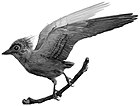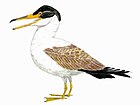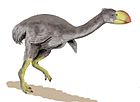Vectiraptor: Difference between revisions
No edit summary |
No edit summary |
||
| Line 8: | Line 8: | ||
| authority = Longrich, Martill and Jacobs, 2021 |
| authority = Longrich, Martill and Jacobs, 2021 |
||
}} |
}} |
||
'''''Vectiraptor''''' (meaning "[[Isle of Wight]] thief") is a [[genus]] of [[dromaeosaurid]], dinosaur from the Barremian aged [[Wessex Formation]] of the [[United Kingdom]]. The type and only species is '''''V. greeni''''', known from associated [[dorsal vertebrae]] and a partial [[sacrum]].<ref>{{Cite journal|last=Longrich|first=Nicholas R.|last2=Martill|first2=David M.|last3=Jacobs|first3=Megan L.|date=2021-12-17|title=A new dromaeosaurid dinosaur from the Wessex Formation (Lower Cretaceous, Barremian) of the Isle of Wight, and implications for European palaeobiogeography|url=https://www.sciencedirect.com/science/article/pii/S0195667121003712|journal=Cretaceous Research|language=en|pages=105123|doi=10.1016/j.cretres.2021.105123|issn=0195-6671}}</ref> |
'''''Vectiraptor''''' (meaning "[[Isle of Wight]] thief") is a [[genus]] of [[dromaeosaurid]], dinosaur from the Barremian aged [[Wessex Formation]] of the [[United Kingdom]]. The type and only species is '''''V. greeni''''', known from associated [[dorsal vertebrae]] and a partial [[sacrum]].<ref>{{Cite journal|last=Longrich|first=Nicholas R.|last2=Martill|first2=David M.|last3=Jacobs|first3=Megan L.|date=2021-12-17|title=A new dromaeosaurid dinosaur from the Wessex Formation (Lower Cretaceous, Barremian) of the Isle of Wight, and implications for European palaeobiogeography|url=https://www.sciencedirect.com/science/article/pii/S0195667121003712|journal=Cretaceous Research|language=en|pages=105123|doi=10.1016/j.cretres.2021.105123|issn=0195-6671}}</ref> |
||
== Discovery and naming == |
== Discovery and naming == |
||
Revision as of 04:09, 20 December 2021
| Vectiraptor Temporal range: Barremian,
| |
|---|---|

| |
| Camellate pneumaticity inside the dorsal vertebrae of Vectiraptor greeni | |
| Scientific classification | |
| Domain: | Eukaryota |
| Kingdom: | Animalia |
| Phylum: | Chordata |
| Clade: | Dinosauria |
| Clade: | Saurischia |
| Clade: | Theropoda |
| Family: | †Dromaeosauridae |
| Clade: | †Eudromaeosauria |
| Genus: | †Vectiraptor Longrich, Martill & Jacobs, 2021 |
| Species: | †V. greeni
|
| Binomial name | |
| †Vectiraptor greeni Longrich, Martill and Jacobs, 2021
| |
Vectiraptor (meaning "Isle of Wight thief") is a genus of dromaeosaurid, dinosaur from the Barremian aged Wessex Formation of the United Kingdom. The type and only species is V. greeni, known from associated dorsal vertebrae and a partial sacrum.[1]
Discovery and naming
Vectiraptor was initially discovered by Mick Green in 2004 within the Wessex Formation, on the Isle of Wight, United Kingdom on the basis of the holotype IWCMS. 2021.31.1-3, consisting of two dorsal vertebra. Later a partial sacrum would be discovered by Nick Chase. The element has been determined to belong to the holotype as all fossil elements were discovered over a short time period, and each find was located within several metres of the others.
The type species V. greeni, would later be erected by Nicholas Longrich, David Martill and Megan Jacobs in 2021. The generic name, Vectiraptor, combines the Latin word 'Vectis," meaning "the Isle of Wight," and the Greek word 'raptor' meaning "thief". The specific name, greeni, is in honour of Mick Green who initially discovered and prepared the type material.
Description

The holotype includes two partial dorsal vertebrae and parts of the sacrum. Although fragmentary, the material shows features a combination of features found only in the Dromaeosauridae, including relatively short and massive vertebrae, tall neural spines, and facets for the ribs set on long stalks.
A number of features, including the animal's large size, the presence of openings in the vertebrae for air sacs, and the tall neural spines, suggest the animal is a member of, or related to, the Eudromaeosauria. The resemblance to eudromaeosaurs from North America suggests a faunal exchange between North America and Europe.
References
- ^ Longrich, Nicholas R.; Martill, David M.; Jacobs, Megan L. (2021-12-17). "A new dromaeosaurid dinosaur from the Wessex Formation (Lower Cretaceous, Barremian) of the Isle of Wight, and implications for European palaeobiogeography". Cretaceous Research: 105123. doi:10.1016/j.cretres.2021.105123. ISSN 0195-6671.










